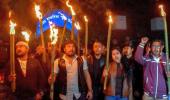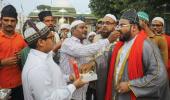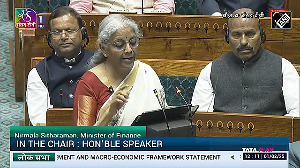'The Citizenship Amendment Bill is a classic case of short-term gain over-riding long-term interest.'
'We must welcome all persecuted minorities from our neighbouring countries and not just Hindus, Sikhs, Christians and Buddhists,' says Colonel Anil A Athale (retd).

The Lok Sabha has already passed the Citizenship Amendment Bill and there is every likelihood that the Rajya Sabha may also pass the measure.
This bill and the measures under it are a classic case of short-term gain over-riding the long-term interest.
The basic premise of the bill, that the citizens of neighbouring countries who are subjected to religious persecution must be given refuge, is unexceptionable. It is absolutely true that Hindus, Sikhs, Christians and Buddhists have been persecuted in our neighbourhood.
Statistics bear out the fact that the proportion of minorities in these countries, over 13% in 1947, has fallen drastically. In the case of Pakistan it has come down to less than 1.5% while in case of Bangladesh it has plummeted from 25% to less than 10%.
But is granting wholesale citizenship to only these refugees the answer?
On the other hand, besides the communities mentioned in the CAB, many other minorities like the Hazara Shias, Ahmediyyas, Kalash people, Ismailis, Sindhis and Baluch nationalists are being persecuted in Pakistan.
'India is a Hindu majority State but not a Hindu Rashtra like the Muslim State of Pakistan. This makes it incumbent on us to take a broader civilisational view.
This ideological confusion in India is a result of an incorrect understanding of the events of 1947.
The events of that year are wrongly depicted as 'Partition'. It was nothing of that sort.
Indian civilisation was always a composite one and people belonging to diverse faiths have co-existed since thousands of years.
In 1947, some provinces of India seceded from the mother country on the basis of religion. This was the first time ever in the 5,000-year history of the Indian subcontinent that such a division had taken place.
The CAB, instead of challenging this process, is unwittingly reinforcing the logic of the 1947 folly.
The CAB has prompted another fear in the north eastern states, that of demographic change. The classic example is the state of Tripura.
Till 1947, this was a predominantly tribal state with various tribes being 80% of the population. But post 1947, the situation has turned topsy-turvy. Today Bengali speaking migrants and their offspring are more than 80% of the population.
The original inhabitants have been reduced to a minority and suffer its attendant loss of political power. The generous rate of growth of population among the migrants has further vitiated the atmosphere.
The restrictive nature of the CAB is born out of a defeatist mentality. It seems that we have accepted the division of the subcontinent as a permanent feature. This does violence to the fact that except for religion, the Indian subcontinent is a geo-political unit.
We share language, culture, dress, music, cuisine and art. At some future date the artificial divide of the subcontinent is bound to wither away.
As a historian who studied the 18th and 19th century history of India, one is struck by the fact that religion as a factor in politics had begun to fade away.
The poison of division on these lines is the gift of the British post the 1857 Indian revolt. Far too many people are still stuck in the 1930s and 1940s to see the past clearly.
If we (rightly) claim Gilgit, Hunza and northern Kashmir are a part of India, then how can we be impervious to the plight of Shias and Kalash people of that region?
It appears that the CAB has taken a short-sighted view of the problem. We must welcome all persecuted minorities from our neighbouring countries and not just Hindus, Sikhs, Christians and Buddhists.
It is still not too late to modify the bill to include all persecuted people as eligible for refuge in India.
As a mother country, we owe it to our future.
Colonel Anil A Athale (retd) is a military historian and specialises in counterinsurgency. He can be contacted at news@rediff.co.in.











 © 2025
© 2025